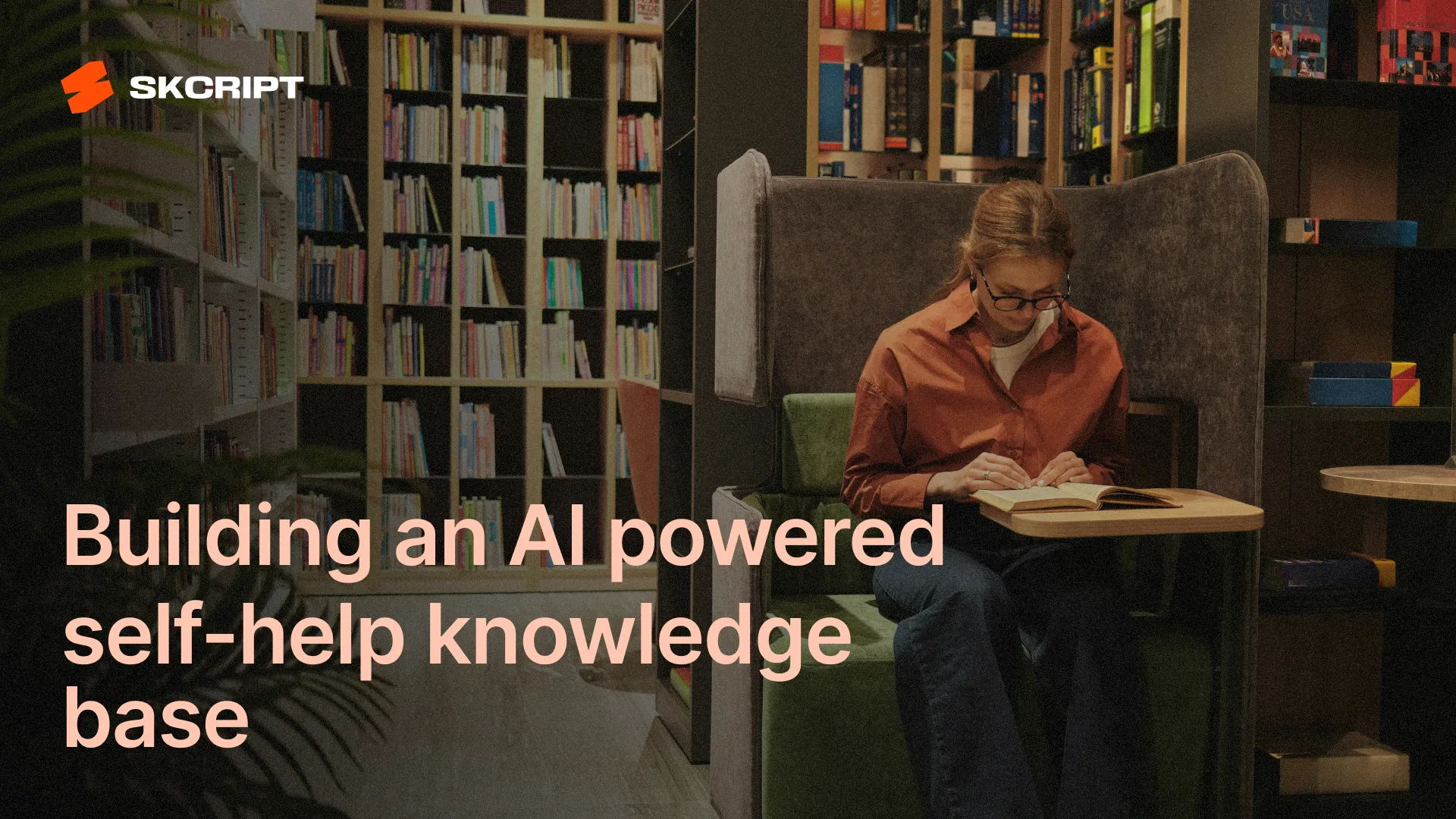Knowledge is power. Making that knowledge accessible to everyone in a company is the greatest asset a company can have. As your company grows, the information density grows, and it becomes harder to find the right information at the right time so that new people who join the company in crucial roles can get answers to their questions quickly.
Skcript has been on a growth trajectory for a while now, and we have a very strong documentation culture internally. We made it a practice to document every decision we make that has an impact in the direction of the company. This way, people who join us new, or who step into a new position in the company can learn how certain decisions were made, and follow/critique the same process to make decisions in the future.
Over time, we realized that there are hundreds of documents, processes, SOPs, spreadsheets, and other information that is too hard for any human on Earth to consume at any given point of time. As soon as we realized this, we knew we had to build something that can help people find the right information at the right time, proactively.
How to build AI Knowledge Base
Thanks to all the scientific advancements in the field of AI, we now have a lot of really good tools that can be put to right use. We started with a simple question - “How can we make all the information we have in our company accessible to everyone in the company, without having to search for it?”. We knew that we had to build something that can understand the context of the question, and give the right answer to the person who is asking the question.
So we decided to build an internal tool for Skcript Web that can offer us this capability.
Context: Skcript Web is our intranet that is accessible to the people of Skcript.
What do we need before we start off any new project? A quick list of requirements. Here’s what we had in mind:
- The knowledge base should be accessible only for the people of Skcript
- The knowledge base should be AI-enabled, so that it can understand the context of the question
- The knowledge base should understand who is asking and potentially their designation, so that it can give the right answer
- There should not be any hallucination when crunching numbers
- The knowledge base should provide appropriate context as to why it is giving the answer it is giving
But why build a AI Knowledge Base?
Does it really make sense to do R&D and invest people’s headspace into building an AI-enabled knowledge base? What value would it add to our people? Will this investment positively affect Skcript’s customers in anyway? In fact, we have an AI powered knowledge base on FeatureOS, our product that helps users find the right support information at the right time. Why do we need another one?
We asked ourselves these questions, and we had a few answers:
- An AI-enabled knowledge base will help people save time and effort in finding the right information
- Since people can find the right information quickly, they get to spend more time on doing the right things - which in turn helps Skcript’s customers
- An AI-enabled knowledge base will help us build a culture of documentation, and help us build a culture of knowledge sharing
Those were the things we needed, and we did the project planning to start working on this new project that we internally called “Skcript Head”.
Can we use an existing tool?
This is one simple evaluation we do every time we start off a new internal project like this. Is there an existing AI-enabled knowledge base software that we can use immediately? We found the answer to be quite simple - Yes & No.
Yes because tools like Slite , Notion AI , and Intercom’s Fin all comes with AI injected into them, but nothing was as intuitive and inside facing as we wanted it to be .
No because these tools were not customizable enough for us to build something that is catered to finding the right information. Are these tools generative? Yes. Are they trained to be focusing on the right things? No. They were just wrappers around OpenAI. Nothing more, nothing less.
So the answer was super clear now for us. We gotta build a LLM that we host, and train it on finding the right information for the user, where it can respect the users’ unique preferences.
Note: Want to build your own hosted AI-enabled Knowledge Base? We’ve got you covered. Ping us and we’ll help you get started.
Sources for Knowledge Base
The first thing to do is to bring all the sources together under one-roof. So we staretd out integrating all the tools we use internally to bring all the information together. We use tools like:
- Stripe
- Salesforce
- Hubspot
- JIRA
- Linear
- Google Drive
- Gmail
- Slack
- Notion
- GitHub
And a few more. We integrated all these tools together, and started to build a knowledge base that can be used by everyone in the company.
Building our own LLM for Knowledge Base
We started off by hosting our own Large Language Model (LLM) on one of our own servers running on the AWS infrastructure, and named it fondly “Large Knowledge Model (LKM)”. Because, why not?
The LLM’s sole purpose is to understand the context of the question, analyze the best sources to get the information from, cache it, and answer the user. Above all, keep the context alive, until the conversation ends. Even better, there are some cases where the user can ask a follow-up question after weeks as well. For example, our CTO would be like “What’s the MRR today?” and the answer is readily available since the LKM has been trained to understand the context of the question, and the user who is asking the question, and respond with the data from Stripe.
What’s the status of Skcript Head LKM now?
It is evolving as we speak. It’s been a month since we started building it, and the second version of the LKM has been running successfully. We are now starting to show it to some of our customers, and we are getting some really good feedback from them, which is encouraging, since we would like to get this into a commercial product space that can help more companies like us + get paid for it.
Need access to Skcript Head LKM (AI-enabled Knowledge Base)?
We’re happy to extend a demo account with you, of course with sample data, and not our documentation knowledge with it. Even better, the sample data is not some lorem ipsum content. The data is real from great startup minds like Paul Graham, Sam Altman, and a few more. We’re happy to extend a demo account to you, if you’re interested in trying it out. Just ping us on Twitter or LinkedIn and we’ll get back to you.
Subscribe to our newsletter
Get the latest updates from our team delivered directly to your inbox.
Related Posts
Using AI to detect Facial Landmarks for improved accuracy
Using AI to detect Facial Landmarks for improved human face recognition accuracy. A complete tutorial on how we used AI to detect facial features of humans.
AI in 2024: What Actually Worked and What’s Coming Next
AI is everywhere, and it’s not just for the big players. Here are some of the most interesting AI projects that worked in 2024.
Skcript's Enterprise AI Manifesto
Our strict guidelines on how we build Enterprise AI products at Skcript.

